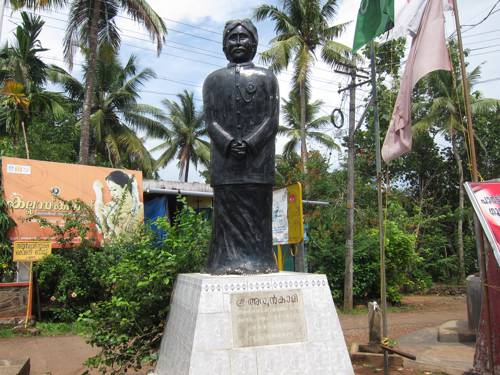
FAQ About Mahatma Ayyankali

Who was Mahatma Ayyankali?
Mahatma Ayyankali was a prominent Indian social reformer and Dalit leader known for his struggle against caste oppression and his efforts towards social reform in Kerala, India. He was born on August 28, 1863, in Venganoor, part of the present-day Thiruvananthapuram district.

What were the major contributions of Mahatma Ayyankali?
Ayyankali made significant contributions by advocating for the rights of oppressed communities, particularly the Dalits, in Kerala. Some of his major achievements include starting schools for Dalit children, leading protests for their right to walk on public roads, and fighting for equal educational and employment opportunities.

What was the Pulaya Movement initiated by Ayyankali?
The Pulaya Movement, led by Ayyankali, sought to challenge the social and caste injustices imposed on the Pulaya community, a Dalit group in Kerala. The movement aimed at improving their living conditions and fighting against the discrimination they faced in society.

How did Ayyankali impact the education system in Kerala?
Ayyankali played a crucial role in challenging the caste-based restrictions in education. He established a school for Dalit children in 1904, and his persistent efforts led to the governmental acceptance of Dalit students in public schools.

What was Ayyankali's approach to social reform?
Mahatma Ayyankali adopted a combination of direct action and negotiation with authorities to achieve social reform. He organized protests, pulled resources within communities, and dialogued with government officials to bring about changes in laws and societal norms that oppressed Dalits.

What is the Villuvandi Yatra organized by Ayyankali?
The Villuvandi Yatra was a protest led by Ayyankali in 1893, where he defied the existing caste norms by riding a bullock cart through public roads, restricted to the upper castes. This act symbolized a direct challenge to caste discrimination and was a pivotal event in the fight for Dalit rights in Kerala.

Did Mahatma Ayyankali collaborate with other reformers?
Yes, Mahatma Ayyankali collaborated with various reformers and organizations committed to social justice. He was involved with Sree Narayana Guru and associated with movements like the Sadhujana Paripalana Sangham to further the cause of social equity.

What leadership roles did Ayyankali hold?
Ayyankali founded and led the Sadhujana Paripalana Sangham, an organization focused on the welfare of the Dalit community. He also served as a member of the Travancore Legislative Council, where he advocated for the rights and upliftment of marginalized communities.

How did Ayyankali use music in his reform efforts?
Music played a significant role in Ayyankali's reform efforts. He promoted Kerala folkloric art forms like Kaikottikali to rally community support and spread awareness about social issues. These gatherings helped foster unity and consciousness among the oppressed communities.

What influence did Mahatma Ayyankali have on women's rights?
Ayyankali was a proponent of women’s rights within oppressed communities. He emphasized women's education and advocated against practices that restricted their freedom. His efforts helped pave the way for better educational opportunities and societal participation for Dalit women.

What were the significant challenges faced by Ayyankali?
Ayyankali faced significant challenges such as resistance from upper-caste communities, social ostracism, and violent backlash against his attempts to dismantle entrenched caste hierarchies. Despite these, his determination and leadership inspired widespread social change.

How is Ayyankali remembered in modern India?
In modern India, Mahatma Ayyankali is celebrated as a pioneering social reformer and leader in the fight against caste discrimination. His legacy lives on through numerous institutions, roads, and educational centers named in his honor, and through annual commemorations of his contributions to social justice.

What was Mahatma Ayyankali's approach to improving economic conditions for Dalits?
Ayyankali worked to improve economic conditions for Dalits by challenging the exploitative labor practices and lobbying for fair wages and work conditions. He encouraged community self-reliance and was instrumental in organizing agricultural labor movements in Kerala.

Can you describe Ayyankali's contribution to public policy?
During his time in the Travancore Legislative Council, Ayyankali pushed for progressive policies affecting health, education, and employment for the oppressed. His advocacy was crucial in the enactment of reforms that improved living conditions for marginalized communities.

What is Ayyankali's connection to the Channar Revolt?
While Ayyankali himself was not directly involved in the Channar Revolt, a movement by Nadar women for the right to wear upper body clothes, his broader struggle against caste-based discrimination aligns with the ethos of the revolt, which sought to dismantle oppressive social norms.

What role did Ayyankali play in labor rights?
Ayyankali was a vocal advocate for labor rights, particularly for Dalit workers. He highlighted the injustice of labor exploitation and organized the first labor strike of agricultural workers in Kerala, advocating for better wages and working conditions.

Did Mahatma Ayyankali use religious reform as a tool for social change?
Although Mahatma Ayyankali did not focus primarily on religious reform, he supported movements that promoted social equality through religious reform. He aligned with Sree Narayana Guru's efforts which emphasized social change over religious orthodoxy, encouraging the equality of all people.

What was Ayyankali's impact on later social movements in India?
Ayyankali's pioneering efforts laid the groundwork for subsequent social justice movements in India. His strategies and achievements inspired later leaders and activists working towards Dalit rights and social equity, such as B.R. Ambedkar and the movements that followed.

How did Ayyankali's efforts influence the educational rights movement in India?
By advocating for the inclusion of Dalit children in public schools, Ayyankali significantly influenced the educational rights movement in India. His success in securing educational opportunities for the marginalized has had a lasting impact on India's educational policies towards equitable access for all children.

Where can one learn more about Mahatma Ayyankali?
To learn more about Mahatma Ayyankali, interested individuals can refer to books focused on Indian social reformers, visit websites dedicated to his biography and works, and explore documentary films. Institutions like the Ayyankali Memorial in Kerala also provide valuable historical insights.
